(word完整版)八年级下册英语(苏教版八年级)8BU1Reading语言点
(完整版)八年级下册英语(苏教版八年级)8BU2Grammar语言点
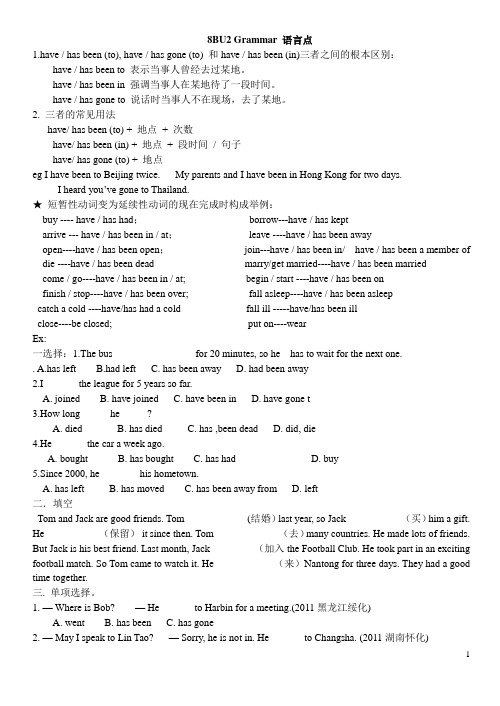
8BU2 Grammar 语言点1.have / has been (to), have / has gone (to) 和have / has been (in)三者之间的根本区别:have / has been to 表示当事人曾经去过某地。
have / has been in 强调当事人在某地待了一段时间。
have / has gone to 说话时当事人不在现场,去了某地。
2. 三者的常见用法have/ has been (to) + 地点+ 次数have/ has been (in) + 地点+ 段时间/ 句子have/ has gone (to) + 地点eg I have been to Beijing twice. My parents and I have been in Hong Kong for two days.I heard you’ve gone to Thailand.★短暂性动词变为延续性动词的现在完成时构成举例:buy ---- have / has had;borrow---have / has keptarrive --- have / has been in / at;leave ----have / has been awayopen----have / has been open;join---have / has been in/ have / has been a member of die ----have / has been dead marry/get married----have / has been marriedcome / go----have / has been in / at; begin / start ----have / has been onfinish / stop----have / has been over; fall asleep----have / has been asleepcatch a cold ----have/has had a cold fall ill -----have/has been illclose----be closed; put on----wearEx:一选择:1.The bus ________________for 20 minutes, so he has to wait for the next one.. A.has left B.had left C. has been away D. had been away2.I ______ the league for 5 years so far.A. joinedB. have joinedC. have been inD. have gone t3.How long _____ he _____?A. diedB. has diedC. has ,been deadD. did, die4.He ______ the car a week ago.A. boughtB. has boughtC. has hadD. buy5.Since 2000, he _______ his hometown.A. has leftB. has movedC. has been away fromD. left二.填空Tom and Jack are good friends. Tom ____________(结婚)last year, so Jack ___________(买)him a gift. He ___________(保留)it since then. Tom ____________ (去)many countries. He made lots of friends. But Jack is his best friend. Last month, Jack _________(加入the Football Club. He took part in an exciting football match. So Tom came to watch it. He___________ (来)Nantong for three days. They had a good time together.三. 单项选择。
(完整)八年级上册英语(苏教版八年级)8AU1Reading语言点
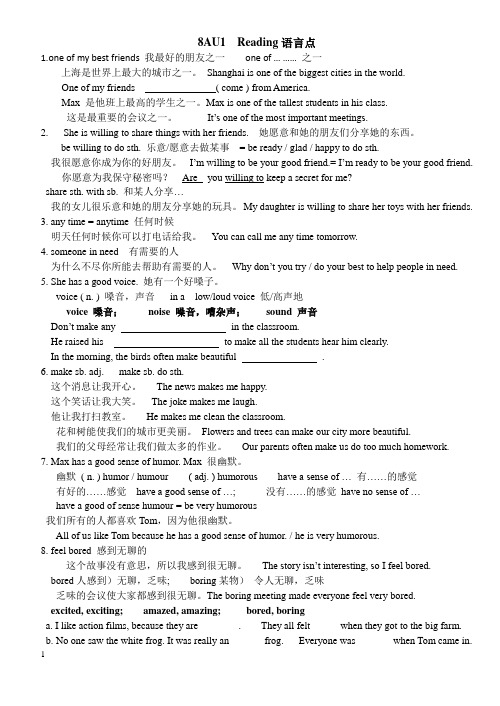
8AU1 Reading语言点1.one of my best friends 我最好的朋友之一one of … …… 之一上海是世界上最大的城市之一。
Shanghai is one of the biggest cities in the world.One of my friends ( come ) from America.Max 是他班上最高的学生之一。
Max is one of the tallest students in his class.这是最重要的会议之一。
It’s one of the most important meetings.2. She is willing to share things with her friends. 她愿意和她的朋友们分享她的东西。
be willing to do sth. 乐意/愿意去做某事= be ready / glad / happy to do sth.我很愿意你成为你的好朋友。
I’m willing to be your good friend.= I’m ready to be your good friend.你愿意为我保守秘密吗?Are you willing to keep a secret for me?share sth. with sb. 和某人分享…我的女儿很乐意和她的朋友分享她的玩具。
My daughter is willing to share her toys with her friends.3. any time = anytime 任何时候明天任何时候你可以打电话给我。
You can call me any time tomorrow.4. someone in need 有需要的人为什么不尽你所能去帮助有需要的人。
Why don’t you try / do your best to help people in need. 5. She has a good voice. 她有一个好嗓子。
八年级下册英语(苏教版八年级)8BU2Reading 语言点

8BU2 Reading 语言点1.去香港旅行take/ have/ go on a trip to Hong Kong2. 去香港度假go on holiday in Hong Kong; have/take a holiday in HK; go to Hong Kong on holiday; go to HK for a holiday; go to HK to spend the holiday;3. We __________(not see) each other since last week. We _________(not see) each other for a week. We haven’t seen each other _________ a week ago.We _______(see) each other about a week ago. We haven’t seen each other ________ a week .4. I miss you so much! miss vt. ①想念,思念; ②错过,没做到其后接名词,代词或doing③ be/ go missing= be/get lost 失踪的,丢失的① Dave非常想念他的爷爷奶奶。
Dave misses his grandparents very much.我会怀念和你一起工作的日子。
I will miss working with you.② Mona非常伤心,因为她错过了火车。
Mona was sad because she missed her train.我不想错过今晚在电视上看那部影片I don’t want to miss seeing that film on television tonight.你昨晚错过了一场很棒的聚会。
You missed a good party last night.我们迟到了,错过了电影的开头。
最新江苏牛津译林版初二下册英语8BUnit1 Reading课件
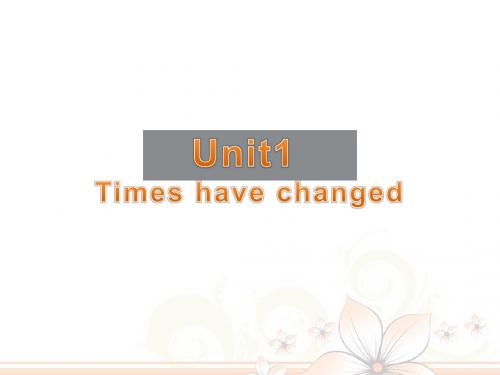
G
A
B
C
D
E
F
Pollution
once
put the waste into the river
Later
Now
Can you see some other pollution around
you?
water pollution air pollution noise pollution light pollution white pollution
changes
• Has the town changed l lot over the years?
buildings
pollution
• Was pollution a problem then?
• Do you think life is better now?
life
Past
Present
D: Well, in some ways it is. … A: …? B: ...
Groups of 4 A: Interviewer( 采访者) B: Facilities C: Pollution D: Life
Many people fail, just because
they can’t see the changes
Q1: Do you know Sunshine Town very well? Q2: Have you ever moved house?
Mr. Chen lives
Before 1965
After
1965
How far
In the In this northern area part of town
八年级下册英语苏教版八年级语言点

八年级下册英语苏教版八年级语言点8BU3 Reading语言点1. notice: 注意到,看到; notice sb do / doing sth; notice that…我没注意到有烟。
我注意到他离开了房子。
我注意到他正在看小说(novel)他注意到有人正在看他。
n. 通知,通告,布告牌上有一个最新通知。
图标 the QQ icon; the tour icon; the back icon3. at the top of ... 在……的顶部山上有座塔。
她正站在楼梯的顶端。
She was standing at the top of the stairs.--反义:at the bottom of… 在…的底部在这一页的底部有一幅漂亮的图片。
There is a beautiful picture at the bottom of the page.你可以在屏幕的下方找到答案。
You can find the answers at the bottom of the screen.一些人在河底部找到了一个宝盒。
Some people found a treasure box at the bottom of the river.3. click on... 点击……4. Asia, Africa, America, Europe adj. Asian African American Europeana European girl/ friend, a European city/ country/ flight世界著名的,举世闻名的姚明是世界著名的篮球运动员。
6. trade n. (不可数) 贸易 WTO: the World Trade Organization国际贸易international trade; 对外贸易foreign trade; 军火贸易the arms trade两国之间的贸易增加了。
八年级下册英语(苏教版八年级)8BU3 Reading语言点
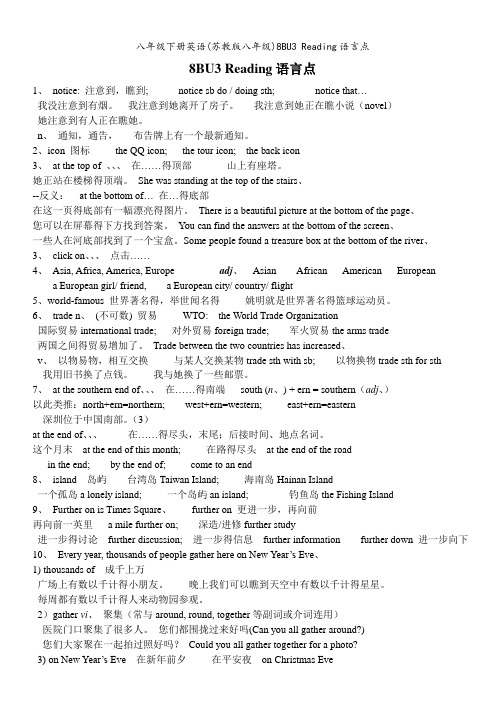
8BU3 Reading语言点1、notice: 注意到,瞧到; notice sb do / doing sth; notice that…我没注意到有烟。
我注意到她离开了房子。
我注意到她正在瞧小说(novel)她注意到有人正在瞧她。
n、通知,通告,布告牌上有一个最新通知。
2、icon 图标the QQ icon; the tour icon; the back icon3、at the top of 、、、在……得顶部山上有座塔。
她正站在楼梯得顶端。
She was standing at the top of the stairs、--反义:at the bottom of… 在…得底部在这一页得底部有一幅漂亮得图片。
There is a beautiful picture at the bottom of the page、您可以在屏幕得下方找到答案。
You can find the answers at the bottom of the screen、一些人在河底部找到了一个宝盒。
Some people found a treasure box at the bottom of the river、3、click on、、、点击……4、Asia, Africa, America, Europe adj、Asian African American Europeana European girl/ friend, a European city/ country/ flight5、world-famous 世界著名得,举世闻名得姚明就是世界著名得篮球运动员。
6、trade n、(不可数) 贸易WTO: the World Trade Organization国际贸易international trade; 对外贸易foreign trade; 军火贸易the arms trade两国之间得贸易增加了。
苏教版译林牛津英语8B单词表(含音标精编版)
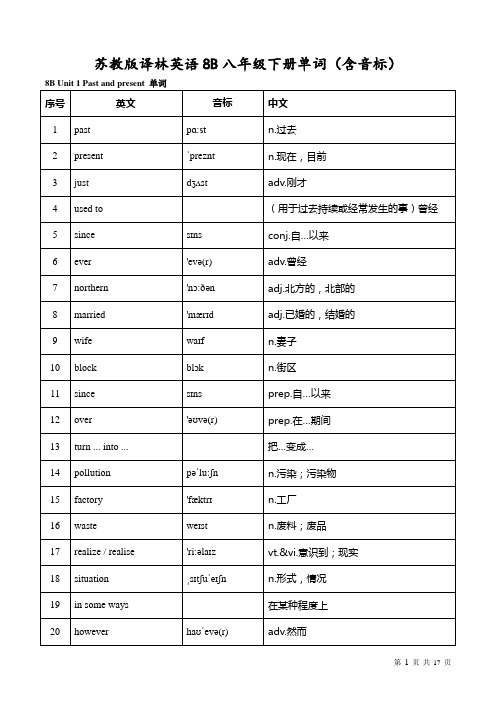
tiny
'taɪnɪ
adj.极小的
18
fall over
摔倒
19
continue
kən'tɪnju:
vi.&vt.继续
20
either
ˈaɪðə(r)
adv.也
21
manage
'mænɪdʒ
vi.&vt.设法完成;管理
22
lift
lɪft
vt.举起,抬高;提高
23
army
'ɑ:mɪ
n.大批,大群
ˈgæðə(r)
*vi.&vt.聚集,集合
54
darkness
'dɑ:knəs
*n.黑暗
55
lawn
lɔ:n
*n.草坪
56
musical
ˈmju:zikəl
*n.音乐剧
57
sail
seɪl
*n.帆
8B Unit4A good read单词
序号
英文
音标
中文
1
read
ri:d
n.读物
2
cooking
ˈkʊkɪŋ
rɪ'məʊt kən'trəʊl
*n.遥控器
48
ah
ɑ:
*excl.(表示惊奇,高兴等)啊
49
channel
'tʃænl
*n.频道
50
word processing
wə:d prəʊˈsesɪŋ
*n.文字处理
51
icon
'aɪkɒn
*n.图标
52
click
(2021年整理)牛津译林八年级下册8B-Unit1-知识点整理

牛津译林八年级下册8B-Unit1-知识点整理(推荐完整)编辑整理:尊敬的读者朋友们:这里是精品文档编辑中心,本文档内容是由我和我的同事精心编辑整理后发布的,发布之前我们对文中内容进行仔细校对,但是难免会有疏漏的地方,但是任然希望(牛津译林八年级下册8B-Unit1-知识点整理(推荐完整))的内容能够给您的工作和学习带来便利。
同时也真诚的希望收到您的建议和反馈,这将是我们进步的源泉,前进的动力。
本文可编辑可修改,如果觉得对您有帮助请收藏以便随时查阅,最后祝您生活愉快业绩进步,以下为牛津译林八年级下册8B-Unit1-知识点整理(推荐完整)的全部内容。
牛津译林八年级下册8B—Unit1-知识点整理(推荐完整)编辑整理:张嬗雒老师尊敬的读者朋友们:这里是精品文档编辑中心,本文档内容是由我和我的同事精心编辑整理后发布到文库,发布之前我们对文中内容进行仔细校对,但是难免会有疏漏的地方,但是我们任然希望牛津译林八年级下册8B-Unit1—知识点整理(推荐完整)这篇文档能够给您的工作和学习带来便利.同时我们也真诚的希望收到您的建议和反馈到下面的留言区,这将是我们进步的源泉,前进的动力。
本文可编辑可修改,如果觉得对您有帮助请下载收藏以便随时查阅,最后祝您生活愉快业绩进步,以下为 <牛津译林八年级下册8B-Unit1-知识点整理(推荐完整)> 这篇文档的全部内容。
8B Unit1 知识点解析与练习1。
past and present 过去和现在past 1). n。
in the past(一般过去时)2)。
adj. in the past few years(现在完成时)3). prep。
walk past 经过= ____________present 1)。
n. 现在, 目前 at present 2). n. 礼物 receive a present 收到一件礼物2。
in the bowl在碗里; on the plate在盘子上3. 1).过去常常做某事(现在不做了)used to do sth。
八年级下册英语(苏教版八年级)8BU7 Reading 语言点

8BU7 Reading 语言点一.词组:1. 采访某人interview sb= have an interview with sb2. 一个ORBIS 医生an ORBIS doctor3. 对..感兴趣be interested in= have/ show interest in4. 告诉我们一些有关失明的情况tell us something about blindness5. 全球约两亿八千五百万人about 285 million people around the world6.有别的眼部问题have other eye problems7.主要在贫困地区mostly in poor areas8. 这些案例中的百分之八十80 per cent of these cases9. 有钱医治have money for medical treatment10. 一架飞行的眼科医院 a flying eye hospital11. 在飞机上on the plane12. 志愿者医生volunteer doctors13. 演示(实施/ 做)手术perform (do) operations (on sb)14. 被当作培训中心be used as a training center15. 我们的很多病人many of our patients16. 承担不起看病/看不起病can’t afford to go to hospital17. 看病go to hospital= see a doctor18. 被邀请登上飞机be invited on board19. 学习有关眼科手术learn about eye operations20. 通过训练他们by training them21. 在我上次访问期间during my last visit ( to sb/ sp)22. 给150位病人做手术operate on 150 patients=150 operations were operated on23 . 为做某事感到骄傲feel/ be proud to do sth (be proud of=take pride in)24.现代医学modern medicine25. 治疗和治愈大多数眼部问题和疾病treat and cure most eye problems and diseases26. 继续我们的工作carry on with our workP96-971. cut one’s body open2. take out a part3. sb be unable to do sth = It is impossible for sb to do sth4.travel all around the world5. help people with eye problems in poor areas6. make an illness go away二.Reading语言点:1. mostly/ most/ almost(1)mostly= mainly 主要地, (2)大部分地most 最;大部分(3) almost= nearly 几乎,差不多这儿的书大部分是儿童书籍The books here are mostly for children.你认为哪个问题最重要?Which question did you think was the most important?大多数的书都非常有趣。
八年级下册英语(苏教版八年级)8BU1-Grammar语言点

8BU1 Grammar语言点一.现在完成时的主要用法(一)表示动作开始于过去并持续到现在,常与since, for, recently, so far, since…ago, over/in/ during the past years等连用。
(二). 表示动作发生在过去,对现在造成影响或结果,常与already, yet, just, ever, never, before连用。
(三). 表示动作直到现在有多少次了. 常与once, twice, many times, how many times连用二.现在完成时的基本句型①陈述句肯定形式。
主语+ have/has+ 过去分词+其它I have had lunch. 已经吃过午饭了。
He has gone to Beijing. 他去北京了。
②陈述句否定形式。
主语+ have/has+ not+过去分词+…(在助动词have/has后+not,可缩写为haven’t/hasn’t)I haven’t had lunch. 我还没吃午饭He ha sn’t gone to Beijing. 他还没有去北京。
③一般疑问句形式及其答语。
Have/Has+主语+过去分词+…?(将助动词have/has提前,句末加问号)肯定回答:Yes , 主语+have/has. 否定回答:No , 主语+haven’t/hasn’t.-Has he gone to Beijing? 他去过北京了吗?-Yes, he has ./ No, he hasn’t.④特殊疑问句形式。
(疑问词+一般疑问句)特词+ have/has+主语+过去分词+…?Where has he gone? 他去了哪里?练习: 1.They have finished their homework. (改为一般疑问句,并做肯定回答)2.Mr. and Mrs. Li have come back.(改为否定句)3.John has played this computer game a few times.(改为否定句)4.We have seen that film. (改为一般疑问句,并做否定回答)5.Mr. Dong has repaired over ten bikes since last Monday. (改为否定句)三.过去分词的构成规则变化1、直接加–ed looked watched 2、以不发音的e结尾的,加–d changed moved3、以辅音字母加y结尾的,变y为i,加-ed studied carried4、重读闭音节,一元加一辅,双写辅音字母,加-ed planned dropped stopped不规则变化见课本第122-123页。
苏教译林版初中英语八年级下册第一单元到第三单元知识点详解

苏教译林版初中英语八年级下册第一单元到第三单元知识点详解Unit 1past n. 过去adj.过去的present n.现在,目前just adv,刚才used to (用于过去持续或经常发生的事)曾经since conj.自...以来prep.自...以来ever adv. 曾经northern adj. 北方,北部的married adj. 已婚的,结婚的wife n.(pl.wives) 妻子block n.街区over prep.在...期间turn into 把...变成...pollution n. 污染;污染物factory n. 工厂waste n.废料;废品realize (=realise)vt.& vi.意识到;实现improve vt.&vi. 改进,改善situation n. 形势,情况in some ways 在某种程度上impossible adj. 不可能的before adv.以前,过去lonely adj. 孤独的,寂寞的from time to time 不时,有时,偶尔anyway adv. 尽管,即使这样husband n. 丈夫interview n. 采访;会见all one's life 一生yet adv. 还,仍recently adv.近来,最近environment n. 环境transport n.交通车辆,运输工具condition n. 环境,条件,状况return vi. 返回last adv.最近,上一次;最后abroad adv. 到(在)国外primary adj. 小学教育的;初级的keep in touch 保持联系communicate vt. &vi. 交流,交际exactly adv.(答语)正是,没错be used to 习惯于,适应于get used to 习惯于,适应于narrow adj. 狭窄的open space n.开阔的空地028B Unit1 知识梳理【重点词组】1.in the bowl an hour ago一个小时之前在碗里的ed to do sth.过去常常做某事be used to doing sth. 习惯于做某事be used to do sth. 被用来做某事3.do a history project on the changes in Beijing over the years 做个有关这些年北京的变化的历史调查4.write a report on the changes in your home town写一个有关你家乡的变化的报道5.know about the different forms of transport对不同形式的交通工具很了解6.talk about transport at different times讨论不同时期的交通工具7.take turns to do sth.=do sth. by turns轮流做某事8.go to school by bike = ride a bike to school骑自行车去学校9.wait for the next one 等下一辆车10.go to school by bus= take a bus to school= go to school on the bus 乘公交车去学校11.interview sb. to get some information 为了得到些信息采访某人12.know sunshine town very well 对阳光镇很了解13.be born 出生14.move house 搬家15.in the northern part of town在这个镇的西部16.get married to sb.= marry sb.= be married to sb.和某人结婚17.marry sb. to sb. 把某人嫁给某人18.move two blocks away搬到两个街区以外19.live in this area 住在这个地区20.since then 自从那以后since I was born/ since last Saturday/since three days ago21.over the years 这些年over the past century 在过去的几个世纪22.in the town centre= in the centre of the town 在镇中心23.turn/change/put sth. into 把某物变成某物24.a steel factory 一个钢铁厂25.put the waste into the river 把垃圾倒入河里put down 记下put away 收好put on 穿上put off 推迟、延期26.take action to improve the situation采取行动改善这种情况27.in some ways 在某些方面on the way (to ) 在……的路上by the way 顺便说no way 没门in any way 无论如何28.most of my old friends大部分我的老朋友29.move away 搬走/move to(into) another town30.see each other as often as before像以前一样经常看到对方31.play cards and Chinese chess 打牌和下棋32.feel a bit lonely 感到有点孤单33.from time to time = at times = sometimes 有时34.because of being alone 因为独自一人35.a group of buildings with streets on all sides街道两边全是高楼on both sides/ on each side36.interview sb.= have an interview with sb. 采访某人37.all his life 整个他的一生38.in the past 在过去at present 现在39.make some notes 做些笔记40.waste sth. on sth./ sb.浪费某物在某物/某人上41.repair over ten bicycles= repair more than ten bicycles修理超过10辆自行车42.teach sb. a lot about the history of China教我很多有关中国的历史43.talk about a film about the history of Beijing 讨论一个有关北京历史的影片44.learn more about Beijing’s past and present对北京的过去和现在了解更多45.hear about/of 听说hear from sb.= receive/ get one’s letter=receive/get a letter of sb.收到某人来信46.living conditions 居住条件47.return sth. to sb. 把某物归还给某人48.go abroad 去国外at home or abroad 在国内外49.at primary school 在小学50.keep in touch with each other 互相保持联系51.make communication much easier使得联系更容易Communicate with sb.和某人保持联系52.take place发生(有目的有计划的)、举行happen发生(偶然发生)53.green hills all around到处都是绿山54.a river runs through the centre of town 一条小河穿过镇中心55.get used to the changes of life习惯了生活的变化56.on one’s own = by oneself = alone 独自57.throw rubbish 扔垃圾58.in some large open spaces在一些大的开阔的地方59.move into new flats搬到新公寓去60.in their free time在他们业余时间61.travel around the town在镇里转转62.have their own cars= have cars of their own有他们自己的汽车e the new words to talk about my hometown用些新词来讨论我的家乡e facts to support my opinions用事实来支持我的观点【重点句型】1.There were always too many people on the bus, and it took a long time to wait for the next one.公共汽车上总是有太多的人,并且要花费很长时间等待下一趟。
(完整)八年级上册英语(苏教版八年级)8AU4Reading语言点
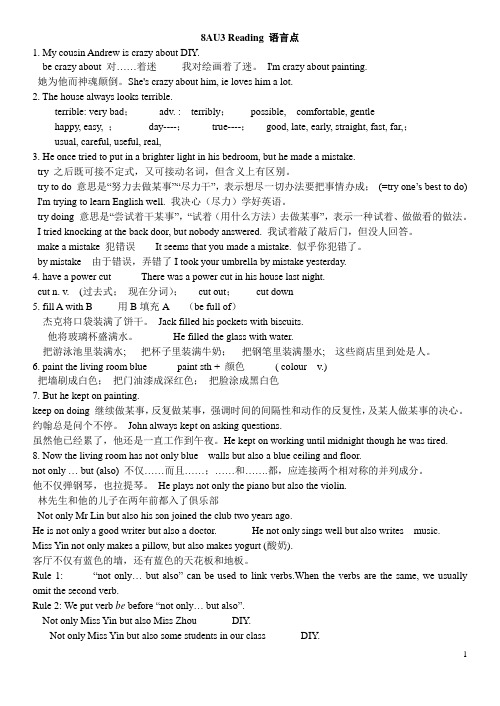
8AU3 Reading 语言点1. My cousin Andrew is crazy about DIY.be crazy about 对……着迷我对绘画着了迷。
I'm crazy about painting.她为他而神魂颠倒。
She's crazy about him, ie loves him a lot.2. The house always looks terrible.terrible: very bad;adv. : terribly;possible, comfortable, gentlehappy, easy, ;day----;true----;good, late, early, straight, fast, far,;usual, careful, useful, real,3. He once tried to put in a brighter light in his bedroom, but he made a mistake.try 之后既可接不定式,又可接动名词,但含义上有区别。
try to do 意思是“努力去做某事”“尽力干”,表示想尽一切办法要把事情办成;(=try one’s best to do) I'm trying to learn English well. 我决心(尽力)学好英语。
try doing 意思是“尝试着干某事”,“试着(用什么方法)去做某事”,表示一种试着、做做看的做法。
I tried knocking at the back door, but nobody answered. 我试着敲了敲后门,但没人回答。
make a mistake 犯错误It seems that you made a mistake. 似乎你犯错了。
by mistake 由于错误,弄错了I took your umbrella by mistake yesterday.4. have a power cut There was a power cut in his house last night.cut n. v. (过去式;现在分词);cut out;cut down5. fill A with B 用B填充A (be full of)杰克将口袋装满了饼干。
牛津译林八年级下册8B-Unit1-知识点整理(K12教育文档)

牛津译林八年级下册8B-Unit1-知识点整理(word版可编辑修改)编辑整理:尊敬的读者朋友们:这里是精品文档编辑中心,本文档内容是由我和我的同事精心编辑整理后发布的,发布之前我们对文中内容进行仔细校对,但是难免会有疏漏的地方,但是任然希望(牛津译林八年级下册8B-Unit1-知识点整理(word版可编辑修改))的内容能够给您的工作和学习带来便利。
同时也真诚的希望收到您的建议和反馈,这将是我们进步的源泉,前进的动力。
本文可编辑可修改,如果觉得对您有帮助请收藏以便随时查阅,最后祝您生活愉快业绩进步,以下为牛津译林八年级下册8B-Unit1-知识点整理(word版可编辑修改)的全部内容。
8B Unit1 知识点解析与练习1。
past and present 过去和现在past 1)。
n。
in the past(一般过去时)2). adj. in the past few years(现在完成时)3)。
prep。
walk past 经过= ____________present 1). n. 现在, 目前 at present 2)。
n. 礼物 receive a present 收到一件礼物2。
in the bowl在碗里; on the plate在盘子上3. 1)。
过去常常做某事(现在不做了)used to do sth。
= often did sth。
in the pastused to be…= … was/were once… = was/were… in the past和某人分享某物 share sth. with sb。
Eg. You often shared food with me in the past。
= You ______ ______ _______ food with me.You used to be so kind to me。
= You ______ _______ ______ to me _____ _____ ______. 2). 习惯于,适应于(做)某事 be/get used to (doing) sth. (现在仍如此做)我习惯于上午六点起床。
八年级下册英语(苏教版八年级)8BU5-Reading-语言点
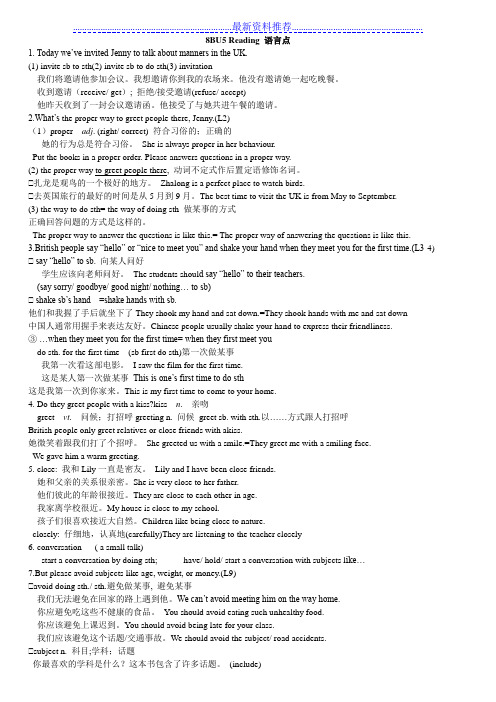
8BU5 Reading 语言点1. Today we’ve invited Jenny to talk about manners in the UK.(1) invite sb to sth(2) invite sb to do sth(3) invitation我们将邀请他参加会议。
我想邀请你到我的农场来。
他没有邀请她一起吃晚餐。
收到邀请(receive/ get); 拒绝/接受邀请(refuse/ accept)他昨天收到了一封会议邀请函。
他接受了与她共进午餐的邀请。
2.What’s the proper way to greet people there, Jenny.(L2)(1)proper adj. (right/ correct) 符合习俗的;正确的她的行为总是符合习俗。
She is always proper in her behaviour.Put the books in a proper order. Please answers questions in a proper way.(2) the proper way to greet people there, 动词不定式作后置定语修饰名词。
扎龙是观鸟的一个极好的地方。
Zhalong is a perfect place to watch birds.去英国旅行的最好的时间是从5月到9月。
The best time to visit the UK is from May to September.(3) the way to do sth= the way of doing sth 做某事的方式正确回答问题的方式是这样的。
The proper way to answer the questions is like this.= The proper way of answering the questions is like this.3.British people say “hello” or “nice to meet you” and shake your hand when they meet you for the first time.(L3-4) say “hello” to sb. 向某人问好学生应该向老师问好。
(word完整版)八年级下册英语(苏教版八年级)8BU1Reading语言点

(word完整版)八年级下册英语(苏教版八年级)8BU1Reading语言点8BU1 Reading语言点1.know …very well(=know a lot about…) 非常了解…我很了解这个地方。
I know the place very well. (提问)---How well do you know the place?I know a lot/ a little about the city. --- How much do you know about the city?2.since “自从…以来”,主句用现在完成时since five years ago= for five years(1)since(prep) +短语(过去的时间点)自从1980年以来,他就一直住在这儿。
He has lived here since 1980. (提问)---How long has he lived here?(2)since (conj)+ 句子(一般过去时)自从我们在学校碰面以来,我们就一直是朋友. We have been friends since we met at school.(提问)----How long have you been friends?(3)既然(conj)Since everybody is here, let’s begin our meeting.自从格林先生来到中国,他一直在这工作。
Mr Green has worked here since he came to China.从昨晚上,这小男孩就患了重感冒。
The boy has had a bad cold since last night .3.ever 曾经,常用于完成时,疑问句。
你曾听过这首歌吗?Have you ever heard the song?4.move house 搬家;搬进…move into…;搬出去… move out of sp.搬到另一个公寓move to another flat;搬离… move away5.in the northern part of town 住在城镇的北部= in the northof town住在中国北部live in the northern part of Chinasouthern eastern western6. married adj.“已婚的,结婚的”get married to sb. 与某人结婚(动作; be married to sb. 与某人结婚(状态)他们已经结婚十年了。
八年级下册英语(苏教版八年级)8BU6-Grammar-语言点教学内容
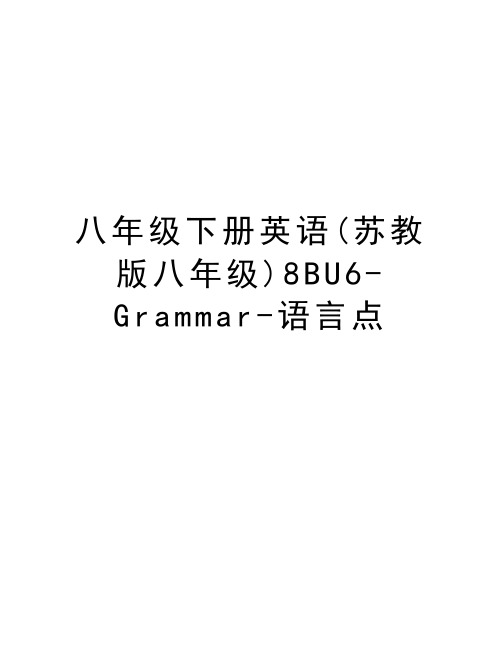
八年级下册英语(苏教版八年级)8B U6-G r a m m a r-语言点8BU6 Grammar 语言点语法要点:It is + adj + to-infinitive 做某事是…该句型中的形容词表示不定式所具备的特征或客观情况。
•It is +adj.+ for sb to do sth. 对某人来说,做某事是…•It is +adj. + of sb to do sth 某人做某事是(某人是….)该句型中的形容词描述的是人的特征、品质等。
It is +adj.+for sb+to do sth. 基本同‘It is +adj.+to do sth’,意思是:“对某人来说,做某事是......”=Doing/To do sth. is +adj.=It is +adj. +that-clauseIt is important for us to learn English well. =To learn /Learning English well is important for us.=It is important that we learn English well.常用的形容词有important,necessary,possible,difficult,easy,interesting,helpful...等,这里的形容词是对所做事情的好坏的性质的说明、修饰。
Difficulties: It’s +adj.+for sb.+to do sth./ It’s +adj.+of sb. +to do sth.相同点: for &of 后的人称代词都用宾格不同的:①...for sb.的句型通常使用表示客观情况的形容词;...of sb. 的句型一般主观感情、人物性格的形容词。
② ...for sb.则可转换成Doing/To do sth.is +adj; 而...of sb.句型可转换成Sb+be+adj+to do sth . It’s kind of you to help me with my English.=You are kind to help me with my English.用‘for’ or ‘of’填空:.1.It is really nice _____ you to help me work it out.2.You are under 18 years old, so it is impossibles _____ you to join the army.3.It is wise _____ you to take enough water.4.It is meaningful _____ everyone to join the Tree Planting Club.5.It is important _____ you to get there on time.6.It is kind _____ Millie to raise money for the poor.7.It is careless _____Simon to make the mistake.8.It is helpful _____ Andy to organize the charity show.语言点:1. donate ... to ... 捐……给…… donate money to charities给慈善机构捐钱donate blood to people in need 给有需要的人献血e.g. It’s kind of you to donate these clothes to Project Hope.你把这些衣服捐给希望工程真善良。
八年级下册英语(苏教版八年级)8BU2 Welcome语言点

8BU2 Welcome语言点1. travel(ling)= have/ take a trip2. go to South Hill for one’s holiday be on holiday go on holidaygo to sp on holiday = take/ have a holiday in sp = go to sp for a/ one’s holiday (holidays)=go to sp to spend a/ the/ one’s holidaygo on trips around China = travel around China3. I’ve been there before.have been to sp 曾经去过某地,说话时人已经回来,一般不能与表示一段时间的状语连用。
(ever, never, before, just, once, twice…)have been in sp 某人呆在某地一段时间,强调人已经在某地,表示的是延续性的动作,可与since或for引导的时间状语连用。
have gone to sp 某人去某地了,可能在途中,也可能已经到达目的地,强调主语已经离开说话时的地点,不能与since或for 引导的时间状语连用。
have been there/ here我的很多同学都去过北京。
Many classmates of mine have been to Beijing.他不在家,他去海南度假了。
He isn’t at home. He has gone to Hainan for a holiday.他已经在澳大利亚待了两周了。
He has been in Australia for two weeks.我之前曾去过杭州。
I have been to Hangzhou before.4. join/ join in/ take part in/ attend他在2002年入党。
八年级下册英语(苏教版八年级)8bu1 reading语言点讲课稿
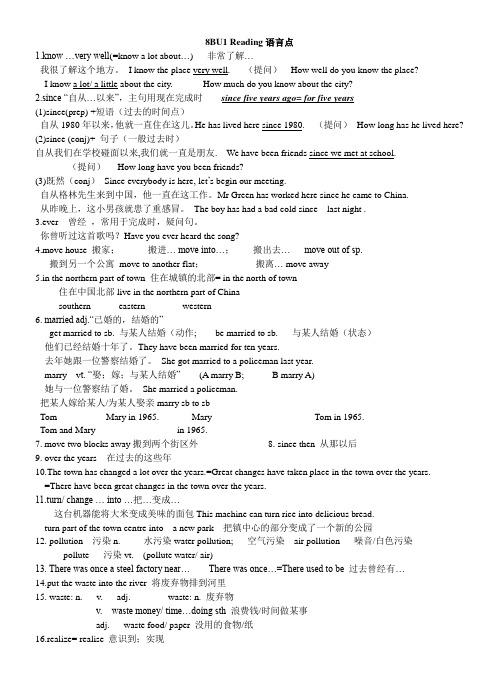
8BU1 Reading语言点1.know …very well(=know a lot about…) 非常了解…我很了解这个地方。
I know the place very well. (提问)---How well do you know the place?I know a lot/ a little about the city. --- How much do you know about the city?2.since “自从…以来”,主句用现在完成时since five years ago= for five years(1)since(prep) +短语(过去的时间点)自从1980年以来,他就一直住在这儿。
He has lived here since 1980. (提问)---How long has he lived here?(2)since (conj)+ 句子(一般过去时)自从我们在学校碰面以来,我们就一直是朋友. We have been friends since we met at school.(提问)----How long have you been friends?(3)既然(conj)Since everybody is here, let’s begin our meeting.自从格林先生来到中国,他一直在这工作。
Mr Green has worked here since he came to China.从昨晚上,这小男孩就患了重感冒。
The boy has had a bad cold since last night .3.ever 曾经,常用于完成时,疑问句。
你曾听过这首歌吗?Have you ever heard the song?4.move house 搬家;搬进…move into…;搬出去… move out of sp.搬到另一个公寓move to another flat;搬离… move away5.in the northern part of town 住在城镇的北部= in the north of town住在中国北部live in the northern part of Chinasouthern eastern western6. married adj.“已婚的,结婚的”get married to sb. 与某人结婚(动作; be married to sb. 与某人结婚(状态)他们已经结婚十年了。
- 1、下载文档前请自行甄别文档内容的完整性,平台不提供额外的编辑、内容补充、找答案等附加服务。
- 2、"仅部分预览"的文档,不可在线预览部分如存在完整性等问题,可反馈申请退款(可完整预览的文档不适用该条件!)。
- 3、如文档侵犯您的权益,请联系客服反馈,我们会尽快为您处理(人工客服工作时间:9:00-18:30)。
8BU1 Reading语言点
1.know …very well(=know a lot about…) 非常了解…
我很了解这个地方。
I know the place very well. (提问)---How well do you know the place?
I know a lot/ a little about the city. --- How much do you know about the city?
2.since “自从…以来”,主句用现在完成时since five years ago= for five years
(1)since(prep) +短语(过去的时间点)
自从1980年以来,他就一直住在这儿。
He has lived here since 1980. (提问)---How long has he lived here?
(2)since (conj)+ 句子(一般过去时)
自从我们在学校碰面以来,我们就一直是朋友. We have been friends since we met at school.
(提问)----How long have you been friends?
(3)既然(conj)Since everybody is here, let’s begin our meeting.
自从格林先生来到中国,他一直在这工作。
Mr Green has worked here since he came to China.
从昨晚上,这小男孩就患了重感冒。
The boy has had a bad cold since last night .
3.ever 曾经,常用于完成时,疑问句。
你曾听过这首歌吗?Have you ever heard the song?
4.move house 搬家;搬进…move into…;搬出去… move out of sp.
搬到另一个公寓move to another flat;搬离… move away
5.in the northern part of town 住在城镇的北部= in the north of town
住在中国北部live in the northern part of China
southern eastern western
6. married adj.“已婚的,结婚的”
get married to sb. 与某人结婚(动作; be married to sb. 与某人结婚(状态)
他们已经结婚十年了。
They have been married for ten years.
去年她跟一位警察结婚了。
She got married to a policeman last year.
marry v t. “娶;嫁;与某人结婚”(A marry B; B marry A)
她与一位警察结了婚。
She married a policeman.
把某人嫁给某人/为某人娶亲marry sb to sb
Tom ________ Mary in 1965. Mary _____________________ Tom in 1965.
Tom and Mary _______________ in 1965.
7. move two blocks away搬到两个街区外8. since then 从那以后
9. over the years 在过去的这些年
10.The town has changed a lot over the years.=Great changes have taken place in the town over the years.
=There have been great changes in the town over the years.
11.turn/ change … into …把…变成…
这台机器能将大米变成美味的面包This machine can turn rice into delicious bread.
turn part of the town centre into a new park 把镇中心的部分变成了一个新的公园
12. pollution 污染n. 水污染water pollution; 空气污染air pollution 噪音/白色污染
pollute 污染vt. (pollute water/ air)
13. There was once a steel factory near…There was once…=There used to be 过去曾经有…
14.put the waste into the river 将废弃物排到河里
15. waste: n. v. adj. waste: n. 废弃物
v. waste money/ time…doing sth 浪费钱/时间做某事
adj. waste food/ paper 没用的食物/纸
16.realize= realise 意识到;实现
他们已经意识到保护动物的重要性。
They have realized the importance of protecting animals.
去年他实现了他的梦想。
He realized his dream last year.(=His dream came true last year.)
17. take action to improve the situation采取措施来改善这种情况
improve= make sth better
18. in some ways 在某些方面,在某种程度上
19.however “然而”,副词,跟后面句子用逗号隔开;but 然而,连词,跟后面句子不用逗号; while 而
It’s raining hard. __________, I think we should go out.
He likes sports, _______ his wife likes music. I am a teacher _______ my brother is a doctor
20. most of my old friends 我的老朋友中的大部分
我的许多老朋友; 我的一些老朋友; 我的老朋友中一个也没有
21. move away 搬走
22. It has become impossible for us to see each other as often as before.
象以前一样经常见面对于我们来说已变得不太可能。
每天锻炼对于我们来说是重要的。
It’s important for us to exercise every day.
23. used to do sth 过去常常做某事
我过去常乘公交去上学。
I used to go to school by bus.
24.play cards 打牌play Chinese chess 下中国象棋
play football 踢足球; play the piano 弹钢琴
25. feel a bit lonely=feel a little lonely 感觉有点孤独
一点点水a little water = a bit of water
26.from time to time =sometimes=at times 有时,不时的
27. know little about… 对…几乎不了解
28. take place 发生/举行
29. lonely/ alone feel a bit lonely 感到有点儿寂寞
alone adv. 单独, 一个人( 用作状语)
lonely adj. 孤独的, 寂寞的(作表语或定语)
1. 他一个人单独居住, 但从不感到寂寞. He lives _____, but he never feels _____.
2. a ______ girl
30. interview n.采访;会见/采访某人have an interview with sb.
interview v. 采访某人interview sb
31. all one’s life 终生,一生all my life; all our lives。
